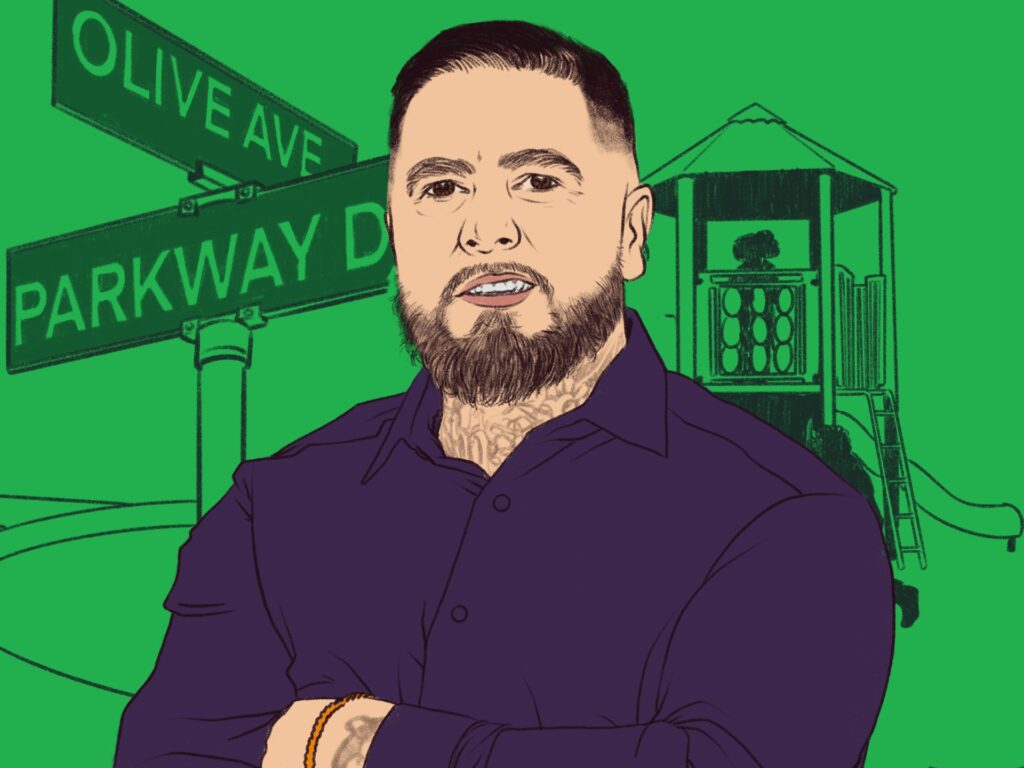Richard Burrell, founder of the nonprofit Live Again Fresno, brings authentic connection and effective support to families navigating challenges in the Parkway neighborhood. His deep understanding stems from shared lived experiences, having grown up in the same neighborhood where he also navigated systemic hurdles including housing instability and limited community resources.
Years later, driving through the area always brought back painful memories. “I kept driving by these motels where I’d lived as a child,” he says. “And I never forgot the smell in those places or how many children lived there.”
One day, he felt compelled to stop and get out of his car with his guitar. “I sang a song and said a prayer out to the universe,” he recalls. Then, glancing up, he saw a woman on a balcony looking out at him. Moved to tears by his prayer and song and his presence in the neighborhood, she asked when he was coming back. A few moments later, a child kicked a soccer ball toward him. After playing soccer with him for a few minutes, the child also asked when he was coming back.
Burrell promised to return that Thursday, two days later. “I took a day to process what this meant,” he explains. “I’m big on consistency and commitment. So for me it meant coming back twice a week and playing soccer with the kids.”
“I’m big on consistency and commitment. So for me it meant coming back twice a week and playing soccer with the kids.”
As Richard built relationships with the families, he gained deeper insight into the significant systemic challenges they navigated daily. He witnessed the impacts of housing instability, observing many families living in crowded motel conditions due to limited affordable housing options. He understood the complexities of diverse family structures and the reality for many children growing up without consistent paternal involvement. He also recognized the extreme economic pressures that forced some mothers into precarious situations, including engagement in sex work for survival, which often created barriers to providing consistent childcare and educational support.
That’s when Burrell stepped in, first on his own and later with volunteers to provide food, help the children with their homework, and provide a gang-free space for students to be after school. A few months later, he created a community space in an abandoned Ethiopian church.
Since opening in 2012, Live Again Fresno has engaged young people and the neighborhood moms through a workforce training model that meets people where they’re at – drawing on the women’s life experiences to develop skills that could go on a resume. The nonprofit has served residents at 15 motel properties, provided more than 25,000 meals, and supported more than 120 children living along Parkway Drive.
With philanthropic help, including from Kresge’s Health and American Cities programs, Live Again Fresno has been able to expand its services. It has built trust through an after-school program that picks up children, field trips that expand their experiences, long-term mentorship to support youth development, and a mobile food service. Richard’s approach is relational, working toward a larger goal of co-powering a community vision for the neighborhood.
The nonprofit is a member of the Fresno Building Healthy Communities collaborative, which promotes health in communities impacted by disinvestment. With support from the collaborative, Live Again secured $1 million from the California State Budget to develop a new community center. The plans for the community center include ideas from the neighborhood’s young people.
Burrell’s dedication exemplifies how, even where resources are scarce, passionate and committed individuals can initiate meaningful change and strengthen community bonds. Live Again Fresno’s approach to community development while centering safety is a model for others to learn from.
“I had no great education behind me. I had no financial backing,” he says. “But there was no way I would allow those children not to have food, and there was no way I was going to allow them to fail or to flunk out because they didn’t have help with their homework.”
“But there was no way I would allow those children not to have food, and there was no way I was going to allow them to fail or to flunk out because they didn’t have help with their homework.”




